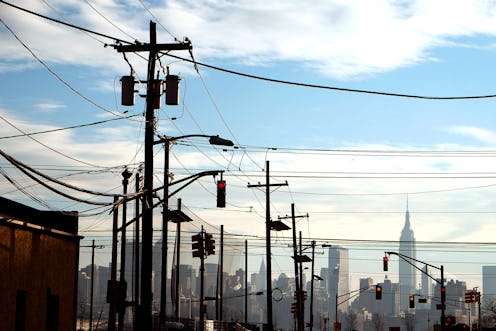News
NYPD Finally Cuts Its Muslim Surveillance Unit
For more than a decade, the NYPD has assigned detectives to infiltrate Muslim communities, with the purpose of listening in on conversations, tracking day-to-day activities, and recording "detailed information about where and how Muslims spent their time." Racial profiling, ladies and gentlemen, is alive and well. But on Tuesday, the NYPD officially discontinued the practice, shutting down the surveillance program known as the Demographics Unit.
The announcement comes following criticism and pressure from the FBI, civil liberties groups, and demands from 34 members of Congress for a federal investigation into the program's tactics. While the Demographics Unit was originally established in order to track terrorist activity, in the 11 years of the program's existence, no leads have ever been generated.
This may be due to the fact that the program seemed to target any practitioner of Islam, without any regard for whether subjects had any links to suspicious activity. In August 2011, the Associated Press published a series of reports on the Demographics Unit, and revealed that detectives spied on Muslim neighborhoods; used "mosque crawlers" to monitor sermons; and photographed citizens with no history of crime.
The Unit infiltrated nearly every aspect of the Muslim communities' livelihood, with Linda Sarsour, a member of the Arab American Association of New York, telling the New York Times:
Those documents, they showed where we live. That’s the café where I eat. That’s where I pray. That’s where I buy my groceries. They were able to see their entire lives on those maps. And it completely messed with the psyche of the community.
After the Associated Press released its reports, two civil lawsuits were launched against the program, as the surveillance was based seemingly exclusively on people's religion, national origin and race. For the NYPD, it seemed that simply being a Muslim was reason enough for suspicion and potential ties to terrorism.
With this sort of a mentality, it comes as no surprise that Muslim relationships with law-enforcement officials have been strained, to say the least. Sarsour said the program created "psychological warfare" in the Islamic community. When news of the surveillance program was first released, dozens of Muslim religious leaders decided to boycott then-Mayor Bloomberg's interfaith breakfast. But there are hopes that this latest development is a first step in easing tensions amongst the two communities. In a press release, New York Mayor Bill de Blasio called the decision to shut down the program:
A critical step forward in easing tensions between the police and the communities they serve, so that our cops and our citizens can help one another go after the real bad guys.
The program is not without its defendants, however. Former Commissioner Ray Kelly, who oversaw the beginnings of the program, claims the practices were entirely constitutional, and that officers had kept to legal guidelines while trying to detect early warning signals of terrorism. (That is, if you consider racial, ethnic, and religious profiling perfectly legal.)
Though the program has been discontinued, investigations around its practices are still pending. Early this year, U.S. District Judge Charles Haight Jr. ordered the NYPD to submit documents regarding the Demographics Unit to authorities. In his ruling, Judge Haight wrote, "The Muslim community is concerned about the attentions being paid to it by the NYPD. That concern is natural and reasonable."
This is not the first time such practices have come under intense scrutiny and criticism. In 1971, a still-open lawsuit was launched regarding the NYPD's investigation of anti-Vietnam War activists and Black Panthers using similar tactics. Consequently, the NYPD agreed to adhere to guidelines, called the Handschu guidelines, that requiring them to refrain from "investigating people's political activities without suspicion of a crime."
Barbara Handschu, the woman after whom the NYPD's surveillance guidelines are named, told the Huffington Post:
It's not that different than what happened back in the `60s, except that somebody's being targeted because of ethnicity and before we were targeted because of political belief. I mean, this is worse. This is racial profiling.
The relegation of the Demographics Unit to the history books is a small victory, it is true, but its mere existence speaks to the miles we have yet to go in overcoming racial, ethnic, and religious biases in the United States. The Demographics Unit is a living extreme of the effects of stereotyping, and citizens of the United States should not have to come under suspicions of terrorism because of their faith, skin color, or choice of garb. As New York Civil Liberties Union Executive Director Donna Lieberman told ABC News,
We hope this means an end to the dragnet approach to policing that has been so harmful to police-community relations and a commitment to going after criminal suspicion, rather than innocent New Yorkers.
